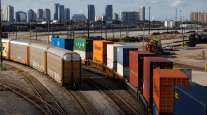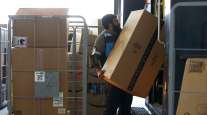Split Decision on Union Representation at 2 Northeast FedEx Freight Terminals
This story appears in the Oct. 20 print edition of Transport Topics.
FedEx Freight drivers at a Philadelphia-area terminal voted last week to become the first U.S. workers at the largest less-than-truckload carrier to become Teamsters members.
However, that vote followed a rejection of the union in an Oct. 10 vote at FedEx Freight’s terminal in Cinnaminson, New Jersey. It also precedes three more representation elections scheduled for Oct. 23 at Con-way Freight in Southern California.
“This vote impacts only city and road drivers at the Croydon [Pennsylvania] facility,” FedEx spokeswoman Michele Ehrhart told Transport Topics. “We believe our open and thriving work environment provides a more flexible, team-
oriented and customer-focused work model than the union offers.”
Drivers voted 26-18 to become part of Local 107. No vote count was disclosed for Cinnaminson.
“These workers are tired of management talking down to them at every chance, and they want decent benefits, including more affordable health insurance,” Teamsters General President Jim Hoffa said.
Ehrhart said FedEx may appeal the Croydon vote. Earlier, the company unsuccessfully tried to conduct votes at both terminals with a combination of drivers and dockworkers.
Meanwhile, asked by TT for comment before the Con-way votes, company spokesman Gary Frantz said, “Con-way’s success has come from providing consistent high-quality service to our customers and treating our employees with dignity and respect, without the need for any union representation. We continue to believe that our employees do not need union representation.”
California union officials didn’t respond to TT’s request for comment.
Among less-than-truckload carriers, only ArcBest’s ABF Freight, UPS Freight and YRC Worldwide are union members. Those companies account for about $9 billion in annual revenue, about the same as the combined total for FedEx Freight and Con-way Freight.
“With several more votes looming at both Con-way Freight and FedEx Freight terminals, we believe [the Oct. 14] election results will re-energize labor and management ahead of the upcoming elections,” said a report from Robert Salmon, an analyst for Deutsche Bank.
The Teamsters in recent months have requested a total of 11 more elections at individual terminals under National Labor Relations Board supervision.
In addition to the three Los Angeles-area facilities, Con-way workers in the Manchester, New Hampshire, terminal have
requested an election.
At FedEx Freight, representation elections are being sought at Indianapolis; Newark and Monmouth Junction, New Jersey; Nashville, Tennessee; Charlotte, North Carolina; Middletown, Pennsylvania; and Chester, Virginia.
Last month, the Teamsters won an election in Laredo, Texas, at Con-way Freight’s terminal, the first-ever representation vote at Con-way’s largest unit. A small FedEx Freight terminal with 14 workers in the Vancouver, British Columbia, area also has voted for union representation.
The union said that FedEx Freight raised pay 80 cents per hour before the two votes and axed a driver scorecard system.
Ehrhart clarified that a pay increase was announced six months ago to become effective in October. She also said the “process of revising this [scorecard] policy started long before any union organizing activity began at any FedEx Freight service center.”
Trucking union votes are done one terminal at a time. The results at one facility don’t affect others. Balloting can be requested once 30% of eligible workers request a union representation election.
FedEx Freight’s parent, FedEx Corp., ranks No. 2 on the Transport Topics Top 100 list of U.S. and Canadian for-hire carriers. Con-way Inc., the LTL carrier’s parent, is No. 4, and Freight is the No. 3 LTL fleet.
Actions at two of the three largest LTL carriers are coming at a time when FedEx is being targeted in a series of suits that challenge the contractor status of workers at the Ground division, the company’s most profitable business unit.
Plaintiffs have claimed those workers should be classified as employees, which could make them eligible for union representation. FedEx has won most of the representation cases.




